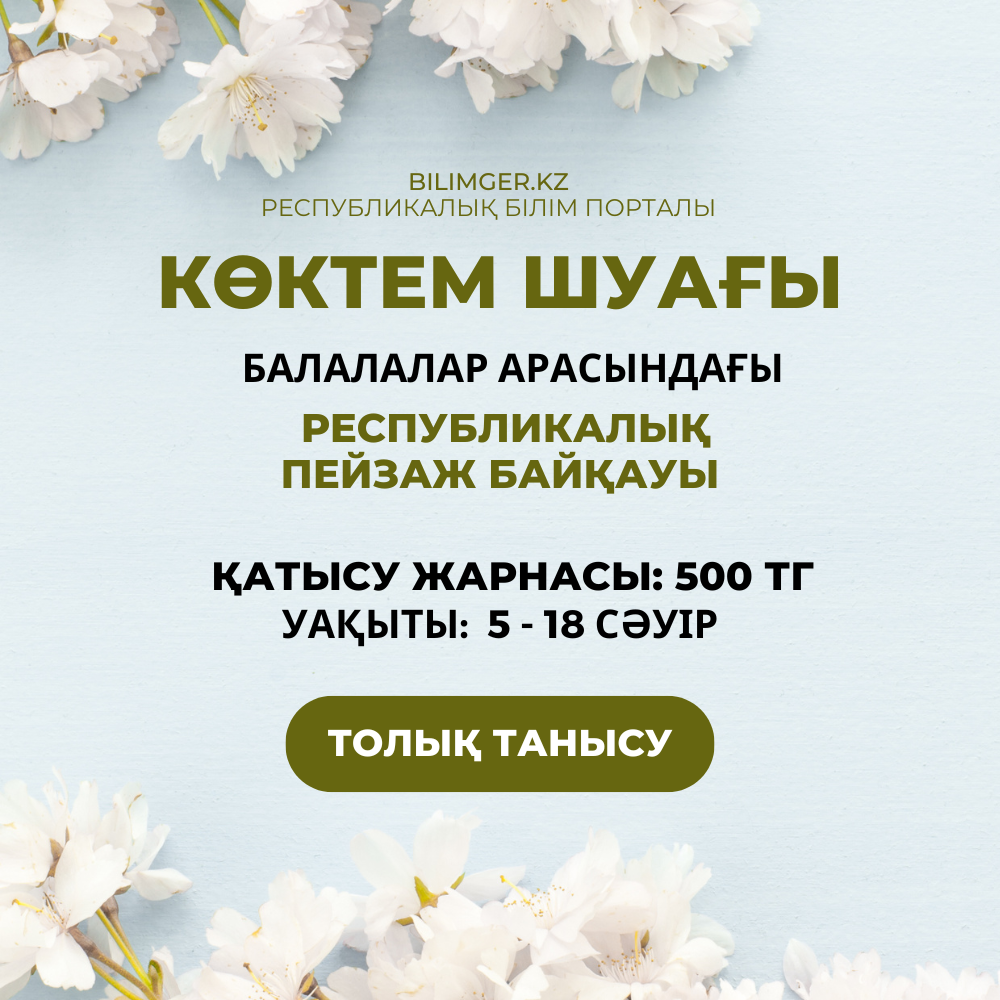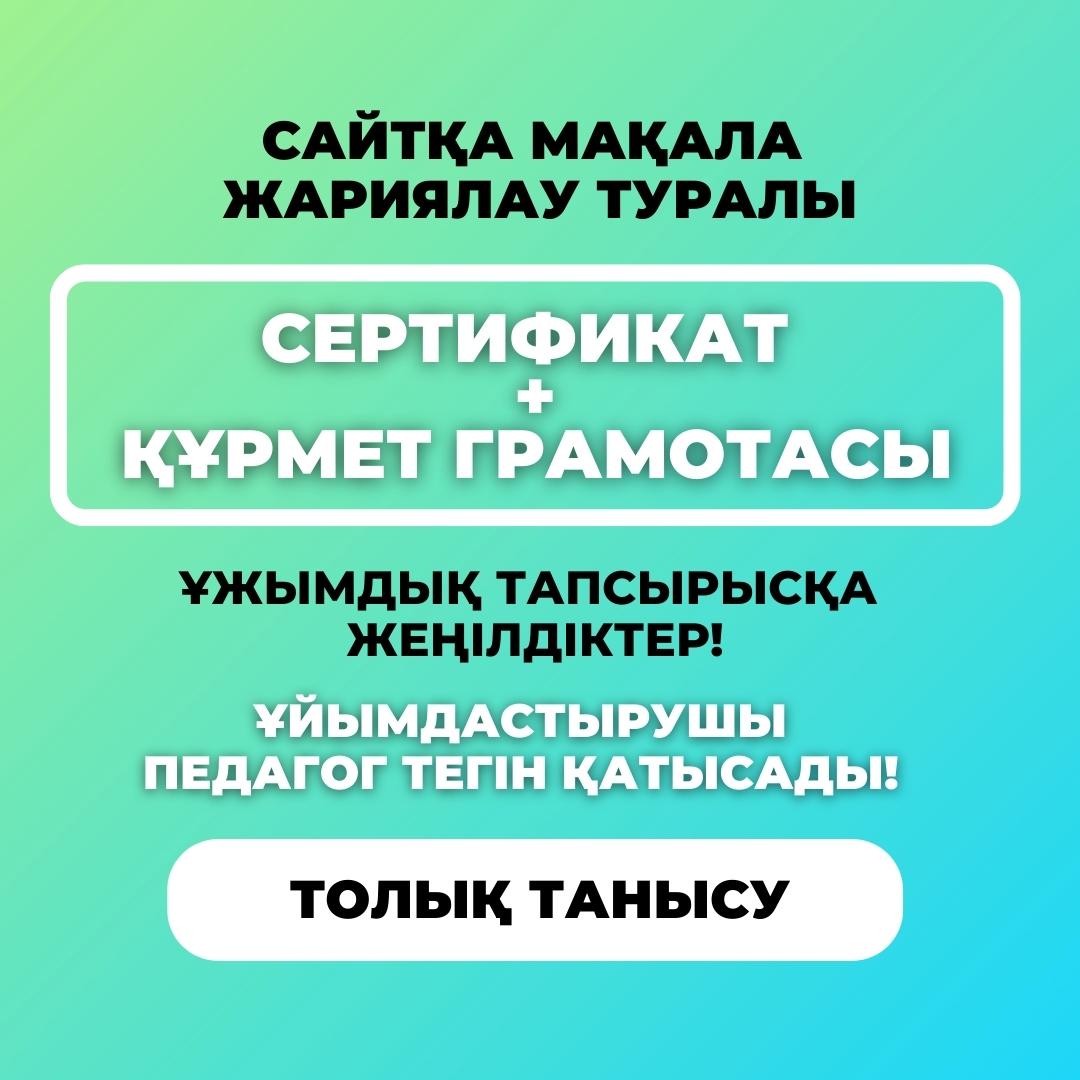Kazakhstan in the world of sport. Children’s games
| Module 1: Kazakhstan in the world of sport
LESSON: 2 Theme: Children’s games 1 |
School:R.Smailov | |||||||
| Date: | Teacher’s name:Auganbaeva Gulzhan Madisbekovna | |||||||
| CLASS: 4 | Number present: | absent: | ||||||
| Learning objectives(s) that this lesson is contributing to | 4.1.2.1 understand an increasing range of supported questions which ask for personal information;
4.2.4.1 respond to questions on an increasing range of general and some curricular topics; 4.4.4.1 write with support a sequence of short sentences in a paragraph to give basic personal information; 4.5.12.1 use adverbs of time and frequency: sometimes, often, always, never to indicate when and how often, begin to use simple adverbs of manner example given well, badly, use common -ly manner adverbs to describe actions example given slowly, quickly; |
|||||||
| Lessono bjectives | All learners will be able to: respond to questions on an increasing range of general and some curricular topics; write with support short sentences which describe people, places and objects; | |||||||
| Most learners will be able to: use imperative forms [positive and negative] to give short instructions on a growing range of familiar topics; use interrogative pronouns who, what and where, how many, how much, how often, how big, what kind of to ask questions on growing range of familiar topics | ||||||||
| Some learners will be able to: : use imperative forms [positive and negative] to give short instructions on a growing range of familiar topics; use interrogative pronouns who, what and where, how many, how much, how often, how big, what kind of to ask questions on growing range of familiar topics; ask questions to find out about present and possibly past experiences on an increasing range of general and some curricular topics; | ||||||||
| Assessment criteria | Learners can talk about children’s games | |||||||
| Language focus | Present Simple; interrogative pronouns | |||||||
| Target vocabulary | Play board games, juggle, do a jigsaw puzzle, play video games, go bowling, play chess | |||||||
| Cross — curricular
links |
PE | |||||||
| ICT skills | CD | |||||||
| Previous learning | adverbs of time and frequency, adverbs of manner | |||||||
| Plan | ||||||||
| Planned timings | Planned activities (replace the notes below with your planned activities) | Smiles Resources | ||||||
| BEGINNING THE LESSON
|
(An activity to revise the language of the previous lesson.)
Ask to pupils to come to the front of the classroom and act out the dialogue from the previous lesson (Ex. 3). Repeat the activity with other pupils.
PRESENTATIONS AND PRACTICE (Activities to present and activate the new language.) |
|||||||
| Middle
4.1.2.1 4.2.4.1
4.5.12.1
4.2.4.1 4.5.12.1
4.2.4.1 4.5.12.1
4.2.4.1
4.2.4.1 4.5.12.1
|
POSTER
5. Listen, point and repeat. Then match. Pupils’ books closed. Put the Children’s games poster up on the board. Point to the activities, one at a time, and say the corresponding phrases. The pupils repeat chorally and/or individually. Point to each activity in random order. Ask individual pupils to name them.
Pupils’ books open. Play the CD. The pupils listen and repeat. If you wish, play the CD again pausing after each word. The pupils repeat chorally and/or individually. Then they complete the activity. Check their answers.
Answers key 2 a 3 d 4 f 5 e 6 b 6 Read and choose. Explain the activity and read the example aloud. Explain that the sentences are clues to find the correct answer. Go through the activity and elicit/explain any unknown words. Allow the pupils some time to complete the activity. Check their answers. Answer key 2 B 3 B 4 A 5 A
7 Let’s play Read the example and explain the game. Divide the class into two teams, A and B. Invite a pupil from each team to the board. One pupil asks what a person from Ex.5 does in his/her free time. The other person has to say what activity the person does. Each correct answer wins a point. The team with the most points wins the game. Suggested answer key A: What does Bob do in his free time? B; He juggles. What does Ann do in her free time? A: She plays chess.etc
STUDY SPOT (Activities to present and practice the present simple and adverbs of frequency.) Pupils’ books closed. Say and write on the board: I walk to school. Underline the word in bold. Present the other persons in the same way. Explain/Elicit the spelling rules of the third persons. Present the negative and interrogative forms. Say and write on the board: I always tidy my room. I am always busy on Saturday. Underline the words in bold. Elicit the adverbs of frequency. Explain that adverbs of frequency go before main verbs, but after the verb ‘to be’. Follow the same procedure to present the remaining adverbs. Pupils’ books open. Go through the Study spot section briefly. Ask the pupils: What do you do every day? Elicit answers. (I play video games every day. I go to school every day. etc) Suggest to the pupils to use activities from Ex. 5.
8 Thinking cap: Complete the questions. Then answer them. Read the instructions and explain the activity. Read aloud the example and ask the pupils to answer the question (e.d. I live in Astana.) Go through the sentences and elicit any unknown words. Allow the pupils some time to complete the activity. Check their answers. Answers key 2 does Bauyrzhan Islamkhan play He plays for Kairan. 3 do you have I have an English lesson twice a week/ every Monday/ 2 hours a week. Etc. (suggested answer) 4 does an ice hockey match last It lasts 60 minutes. 5 do you like I like team sports. (suggested answer)
9 What do they do every day? Match and say. Read the instructions and the example and explain the activity. Remind the pupils to look at the Study spot box for the adverbs of frequency key. If necessary, provide the pupils with another example. Allow the pupils some time to complete the activity. Check their answers. Answer key 2 e Aizhan never juggles. 3 c Ulan always plays chess. 4 b Sultan never does a jigsaw puzzle. 5 f Berik sometimes goes bowling. 6 d Marzhan usually plays video games. |
Track 3 CD1 | ||||||
| ENDING THE LESSON
4.2.4.1 4.5.12.1
|
(An activity to consolidate the language of the lesson)
Ask the pupils to say what they always/sometimes/never do in free time (e.g I sometimes play board games, etc). ACTIVITY BOOK (Optional) If you wish, you can assign some or all of the corresponding activities from the Activities Book for homework. If this is the case, make sure you explain them first in class. |
|||||||
| Additional information | ||||||||
| Differentiation – how do you plan to give more support? How do you plan to challenge the more able learners? | Assessment – how are you planning to check learners’ learning? | Cross-curricular links Health and safety check ICT links
Values links |
||||||
| | | | ||||||
| Reflection
Were the lesson objectives/learning objectives realistic?
Did I stick to timings?
What changes did I make from my plan and why? |
Use the space below to reflect on your lesson. Answer the most relevant questions from the box on the left about your lesson | |||||||




